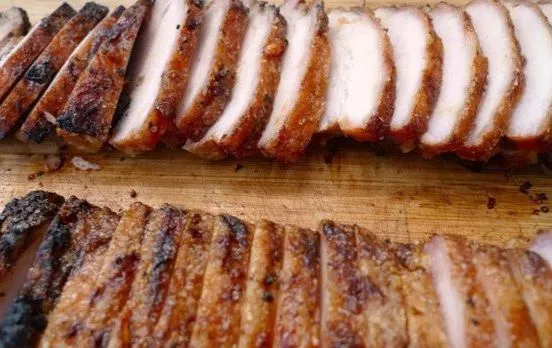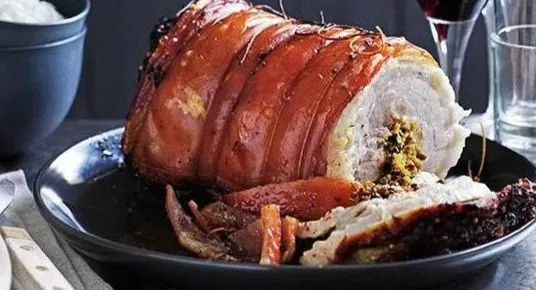Updated on April 18, 2025 by admin
What happens when a Muslim eats pork? Interest and fascination have focused on the dietary rules and practices of the world’s major religions. The Islamic faith is essential since it has a set of rules known as halal (permitted) and haram (prohibited). In Islam, eating pork is banned for many reasons.
We want to illuminate the many aspects of eating pork among Muslims by examining its theological underpinnings, cultural importance, and probable health consequences. This conversation is not meant to pass judgment or spread opinions but to educate about a religion significant to millions of people worldwide.
Religion-based dietary limits have long had an important effect on the development of distinct cultures and customs. The level of detail of many religious traditions can be better understood by learning the reasons underlying their respective prohibitions.
Because of its foundation in the teachings of the Quran, the major religious text of Muslims, and the Hadith, the recorded sayings and actions of the Prophet Muhammad, Islam’s ban against eating pork has continued for centuries.
What Happens if Muslims Eat Pork?

Islamic dietary rules strictly forbid the consumption of pork and marshmallow. Eating pork is forbidden in Islam and has important cultural and religious implications for Muslims. The article examines the theological and medical consequences of pork consumption among Muslims.
Implications for Religion:
A few lines in the Quran restrict the consumption of pork: 2:173 in Surah Al-Baqarah, 6:145 in Surah Al-An’am, and 22:30 in Surah Al-Hajj. Because pork is linked to uncleanliness and can injure the body and soul, these holy books underline its impurity and prohibition.
Impacts on Culture and Society:
The ban on eating pork has a significant impact on Muslim communities’ cultural and social fabric outside the field of religious belief. Food is integral to these tribes’ social lives, rituals, and sense of self.
Issues in Health:
- The ban on Muslim that eats pork has health implications that go beyond its religious importance. Scientific and medical studies have proven the health risks associated with eating pork, supporting the Islamic ban on it.
- Trichinella spiralis and Taenia solium, two worms found in pork, are responsible for diseases like trichinosis and cysticercosis. Muscle pain, fever, neurological conditions, and death are just some of the serious consequences of these worms.
- An increased risk of cardiovascular illnesses such as stroke, heart attack, and hypertension may be related to pork’s high cholesterol and fat content.
- Overusing medicines in livestock, including pigs, has led to a rise in antibiotic-resistant bacteria. Antibiotic resistance can develop from the careless use of antibiotics in animal agriculture, which is a major risk to human health.
Can Islam eat pork?

- Pork is not allowed in the Muslim diet since it is banned under Islamic law. In Islam, eating pork or anything made with pork is strictly forbidden. The Quran and the Hadith, which relate to the words and actions of the Prophet Muhammad, provide the religious foundation for this ban.
- Halal, the Islamic dietary law, specifies which items Muslims can eat. Multiple phrases in the Quran reject pork, including Al-Baqarah 2:173, Al-An’am 6:145, and Surah Al-Hashr 59:5. Pork consumption is strictly forbidden in the holy book of the Quran because it is considered unclean.
- Their religion requires Muslims to adhere to these dietary rules. The ban on pork is a widely acknowledged instruction in Islam, though its meaning and application may vary depending on which Islamic researcher or school of thought you ask.
What happens if a Muslim eats pork?

One or more of the following may occur if a Muslim consumes pork:
- Due to their religious beliefs, Muslims forbid pork. According to Islamic dietary law, which is based on the Quran and the Hadith (the teachings and practices of the Prophet Muhammad), it is forbidden.
- Many Muslims who carefully consume pork may feel shame or regret for breaking a basic tenet of their faith.
- Some Muslims have the view that eating pork can hurt their spiritual cleanliness and closeness to Allah.
- Eating pork can cause problems in Muslim communities on both a social and cultural level. In more traditional Muslim countries, this could be considered a serious sin and could result in rejection from loved ones and social isolation.
- Eating pork may cause one to examine their religious beliefs, knowledge of Islamic dietary limitations, and compliance with religious principles.
- Muslims who consume pork can ask for forgiveness from Allah and perform acts of sorrow to make up for their sin, such as praying, reciting Quranic passages, or giving to charity.
- Some people may use this experience as motivation to learn more about Islamic dietary rules and develop a deeper comprehension of Islam. To avoid similar situations in the future, they might consult religious authorities, participate in Islamic lectures or classes, or read religious materials.
FAQs
Ans: No, according to Islamic dietary laws (halal), consuming pork is strictly forbidden for Muslims.
Ans: Islam’s prohibition on pork is derived from religious teachings found in the Quran and the Hadith (sayings and actions of the Prophet Muhammad). The specific reasons are not explicitly mentioned, but Muslims believe that Allah (God) has forbidden it as a test of obedience and as a means to promote health and spiritual purity.
Ans: In certain circumstances where a Muslim’s life is at risk due to starvation or a lack of alternative food sources, the consumption of pork may be allowed as a matter of necessity. However, even in such cases, strict conditions and limitations apply to all Muslims.
Ans: The consumption of pork is considered a major sin in Islam. The exact consequences are ultimately between the individual and Allah, but it is generally understood to violate religious obligations. It is encouraged for Muslims who have consumed pork unknowingly or by mistake to seek forgiveness from Allah and repent.
Conclusion
As a result, eating pork is against Islam and is a serious sin. Both the Quran and the Hadith, the two most respected Islamic texts, forbid believers to eat pork. One example is the differentiation between halal (approved) and haram (prohibited) foods. Like alcohol and other drugs seen as impure or damaging to the body and spirit, consuming pork is forbidden in Islam. Avoiding pork is one way for Muslims to show they are following God’s commands and doing what is right and beneficial for themselves, as they believe God has supplied such advice. We hope you enjoy reading this article about what happens when a Muslim eats pork. Also, please share it with others.